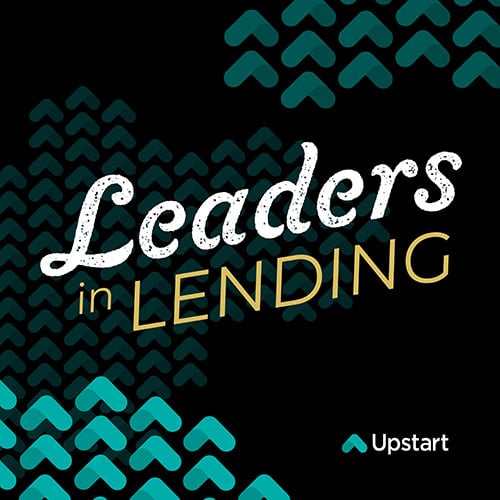Leaders in Lending | Ep. 92
Rethinking Marketing and Incentives for Engagement
In this episode, Karrie Drobnick, Chief Operating Officer at Verve, talks about growing and rebranding their credit union to spur robust growth.


GUEST SPEAKER
Karrie Drobnick

ABOUT
Verve, a Credit Union
Founded in 1937, Verve, a Credit Union, is a member-owned, not-for-profit financial cooperative serving nearly 65,000 members at 20 locations. Verve believes this name stands for their characteristics: enthusiastic, energetic, strong and driven.
Key Topics Covered
- Their use of a recognizable and relatable spokesperson
- How incentives can drive both good and bad behavior for sales teams
- Where the opportunities in blockchain are for lending and financial services

“If [blockchain] is truly touted as the safer spot that's truly your footprint, how is this not leading to better lending decisions and better financial information?”

"Credit unions have historically been very good at understanding the relationship and their member. And so [blockchain] feels like a natural fit for a credit union to really do the right things with in order to understand the borrower’s true buying power.”

“AI is going to truly change a lot of things, and I do believe that there's a degree of AI that's going to reimagine pretty much every position, from from bottom to top.”
EPISODE RECAP & SUMMARY
In this episode, Karrie Drobnick, Chief Operating Officer at Verve, talks about growing and rebranding their credit union to spur robust growth. She also talks about creating a new personality for the company and then translating that into a better experience for members.
Join us as Jeff and Karrie discuss:
- Their use of a recognizable and relatable spokesperson
- How incentives can drive both good and bad behavior for sales teams
- Where the opportunities in blockchain are for lending and financial services
Verve's use of a recognizable and relatable spokesperson
Drobnick started at Verve on the marketing and technology side of things, helping them rebrand and reposition themselves in the credit union marketplace.
“We learned a lot of interesting things around how people are going in to be approved for a lending decision and how unnerving that is for a younger audience,” Dobrick explained. “And that was something we wanted to connect with specifically.”
Having experience in the insurance industry, she was familiar with the innovative thinking that goes into financial services marketing. While other credit unions tend to advertise using their products, Drobnick knew this alone wasn’t enough to stand out.
To create a more entertaining presence and speak to the younger audiences, a Verve spokesperson was introduced. Drobnick and her team created a character that was relatable and funny, giving the company a foundation and a channel for attracting a younger audience into the world of lending.
A recognizable spokesperson gives the company a face and a feel to be remembered, giving Verve an advantage in growing new members.
How incentives can drive both good and bad behavior for sales teams
Incentives can be a great way to keep a team motivated and moving — but finding the right kind of incentive is key to ensuring that the opposite doesn’t happen.
There are certain behaviors and levels of performance that a sales team can naturally bring to the table, but once those skills are rewarded and paid for, it can become less natural and more about the incentive.
There are also going to be team members who come from different roles in their career background where the incentives (ie; commission) were different from what their current company offers. Because of this, the type of incentives that an institution offers are going to affect their team members' approach to work in unique ways.
This realization made Drobnick look at incentives for her team in a different light, telling them, “We don't want you to have the wrong incentives, we want you to go back to what the mission of this organization is. So if you're doing that, we want to pay you the right way.”
Ultimately, incentives can be a great way to keep the sales team working hard, but they must be aligned with the goals of the organization to keep workflow steady.
Opportunities to apply blockchain to financial services
Blockchain could unlock a multitude of opportunities for financial services. If members were able to truly own their information and have their financial data follow them around and ensure the security that the blockchain offers, credit unions could begin to see a more streamlined lending experience for members.
Because the blockchain is tied to the owner, financial advisors would get a much better view into a member’s financial footprint and buying power: Seeing their spending history, assets and any other information that the member chooses to share.
“Ultimately I see the use case being putting yourself more in control and putting yourself in a position and for the benefit of financial,” Dobrick explained. ”This is supposed to be your imprint of ultimately how you have performed and what you have available to you. That’s an easier credit decision.”
Creating that sovereignly owned and individually controlled financial data on blockchain seems like an obvious move for something as personal and private as financials. This type of change could lead to faster lending experiences.
Credit unions historically pride themselves on their relationships and understanding of their members, and advancements in the use of blockchain could only deepen that understanding.
Stay tuned for new episodes every week on the Leaders in Lending Podcast.




